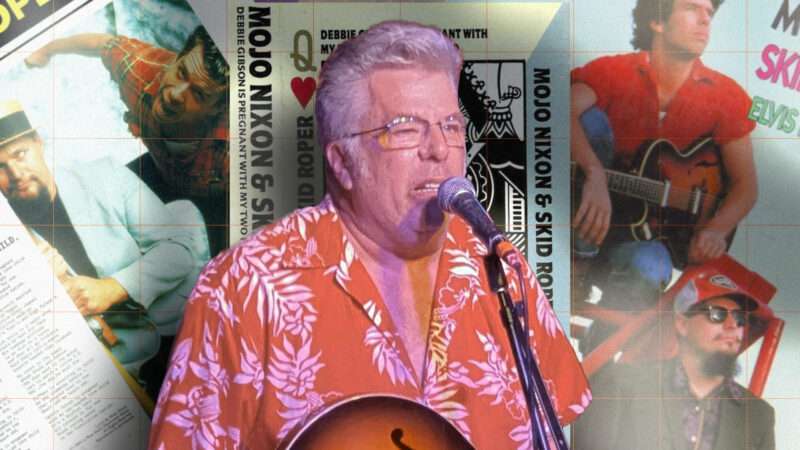
The Super Bowl will be played this weekend, but at least one super fan is going to miss it. Mojo Nixon, the gleeful psychobilly singer, died Wednesday at age 66. Few things in life thrilled Mojo more than football, something we learned from his 1995 song "Not As Much As Football." In that tune, the comic troubadour listed several things he loved just a little bit less than the sport, including: Richard Petty, spaghetti, meatballs, bigfoot trucks, shooting ducks, Dale Earnhardt, and Montreal.
Obituaries of Nixon emphasized what Rolling Stone called his "supremely weird yet singular career," which reached its commercial apex when the novelty song "Elvis is Everywhere" hit the U.S. charts in 1987. (The record was a product of Nixon's long-time collaboration with musical partner Skid Roper.) While describing Nixon as a social satirist and comedian is not exactly inaccurate, it minimizes a career spanning decades that produced a catalog of eclectic yet distinctive—and purely American—songs. Yes, Mojo Nixon was funny. But he could also be arch, critical, and on occasion brilliant.
It seems an improbable coincidence that Nixon died the same week Tracy Chapman and Luke Combs singing "Fast Car" at the Grammy Awards went viral. Nixon, like Chapman, belongs to the millions of Americans who fondly recall mixtape America in the 1980s. Back then, the courting rituals of middle-class teens often involved assembling cassettes of songs with lyrics hinting at unspoken attraction. Mixtapes, played on walkmans or in cars, delivered a wide spectrum of communication and emotion. Whenever a Mojo Nixon song appeared, the message at that moment in the mix was pretty simple: Be free and have fun.
In her new book, Live From the Underground, Katherine Rye Jewell details the diversity of the college radio scene of the 1970s and '80s that offered Chapman, Nixon, and a plethora of other outsiders a welcoming place on America's airwaves. Though Nixon's brash, hormonal, and juvenile aesthetic undoubtedly resonated with millions of American teenage boys, commercial radio (and nascent music television) showed little initial interest. But rowdy performances in college towns earned Nixon a following, and after cleaning up his act he made it to MTV. That's when America first widely encountered Mojo Nixon, when "Elvis is Everywhere" and "Debbie Gibson Is Pregnant With My Two-Headed Love Child" were placed in regular rotation.
As a musician, Nixon's guitar playing was proficient, if more noteworthy for energy than for precision. Over his long career, he capably interpreted distinct styles; he stole from James Brown for the funky "Louisiana Liplock" riff, and his country chops (as exemplified on a song like "Are You Drinking With Me Jesus") were indisputably top-notch. It was in vocal performance where Nixon excelled. On "Don't Ask Me Why I Drink (The Reason's Worse Than You Think)" Nixon bellows, howls, yells, and whispers the song's title repeatedly in so many different ways that he ends up telling a story without needing additional words. His vocalizations force the listener to imagine the song's entire (likely horrific) backstory.
Politically and culturally, Nixon was always pro-freedom. He once described his politics as "libertarian cynicalist anarchist." He hated lawyers, banks, regulators (especially the FCC), cable TV companies, Martha Stewart, France, music companies, and corporate radio networks. He loved Elvis, football, girls, stock car racing, alcohol, waterslides, barbecue sauce, Cheez Whiz, Royal Crown Cola, and Pomade. While nominally a libertarian—he was known to wear a "Vote Libertarian" T-shirt onstage and attended at least one Libertarian Party convention—his politics might be most accurately described as unorthodox, inconsistent, even anti-ideological. At different times, in different songs, Nixon gleefully endorsed trespassing, assault, and the communal ownership of land and alcohol. He believed deeply in hedonism, and he practiced it until the day he died. He was pro-legalization of just about everything. His songs warned against the growing threat of surveillance ("My TV Is Watching Me"). And he hated scolds and censors, appearing on CNN's Crossfire in 1990 to debate Pat Buchanan over the constitutionality of requiring warning labels on record albums.
Mojo Nixon understood there was nothing—not even the most existential dread—that couldn't be cured by a good Foghorn Leghorn cartoon. Always wary of organized religion (except, perhaps, the Church of the SubGenius), he remained a devoted lifelong Presleytarian. (Nixon's "Holy Trinity" consisted of Elvis, Foghorn Leghorn, and Otis, the town drunk on The Andy Griffith Show.) He was purely and unapologetically pro-America during the Reagan age, but he didn't express his patriotism in the Gipper's manner. "Let me tell you, man," he bellowed in one MTV promo. "America was founded by the outcasts of Europe…by slaves…by people that were kicked out of other countries…religious nuts, weirdos, mutants, geeks!"
Like America, Mojo Nixon was large and contained multitudes. He made the world a funnier place, and for that he will be missed.
The post Requiem for a Redneck: Mojo Nixon, 1957–2024 appeared first on Reason.com.







